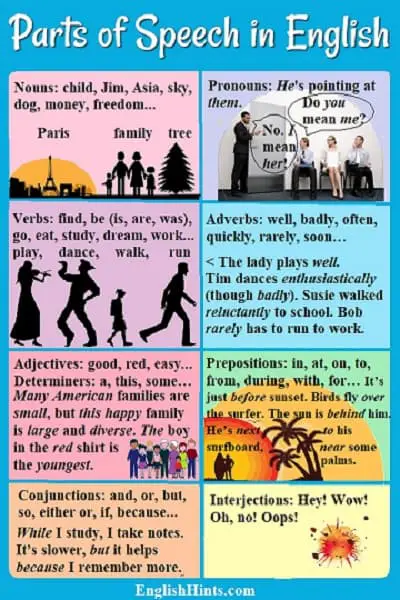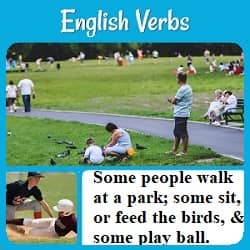Parts of Speech in English (with Examples)
There are eight (or nine) parts of speech in English: nouns, pronouns, verbs, adjectives (& determiners), adverbs, prepositions, conjunctions, and interjections.
They separate words into groups based on their use. Nouns name things, verbs usually show actions, adjectives describe, conjunctions connect, etc.
It's important to understand them because they show how words are used in sentences. To speak English well you need to know how to form sentences, and where to use each type of word.
(See English Sentence Structure for examples of how to use the English parts of speech in sentences.)
Essential English Parts of Speech
Nouns (or pronouns) and verbs are the most basic building blocks of sentences. You cannot express a complete thought without them!
Nouns are names of a person, place, thing, or concept. Examples: child, Mary Smith, parents, beach, mountains, London, Korea, table, chairs, money, time, distance, peace, ideas.
Pronouns (I, you, he, she, it, we, they, me, him, her, us, and them, etc.) can take the place of nouns in sentences.
See English Nouns and English Pronouns for explanations and examples. They show you how to use different types of nouns and pronouns.
Verbs express action (go, find, make, get, take, live, die, eat, think, etc.) or state of being (be, seem, appear, need.)
For more information on different types of verbs and their uses, see English Verbs and Modal Verbs.
You will find that many words can be used as more than one part of speech in English. For example, many words can be either a verb or a noun: act, call, need, play, show, work, and many more. To act is to do something. (It can als mean to take the part of someone else in a play, as an actor does.) An act is something that is done (or one part of a play.)
An interesting example of the way a word may change from one part of speech to another is the word 'hand.' It is usually a noun-- the part of the body that can hold things. However, we also use it as a verb: 'to hand', when a hand gives something to someone else. A teacher 'hands out' papers or asks students to 'hand in' their homework. A bank robber shouts, "Hand over the money!"
Secondary Parts of Speech in English
Adjectives describe nouns or pronouns. They usually occur before the noun they describe or are connected to it by a verb like ‘to be.’ (The quiet man... The man is quiet.) Examples of adjectives: quiet, noisy, early, late, good, bad, long, short, green, red, Chinese, American, difficult, easy.
Determiners. Some linguists consider determiners as a category separate from adjectives. (Others count them as special types of adjectives, since they modify nouns as adjectives do.) They include
- articles (a, an, the),
- demonstratives (this, that, these, those),
- numbers,
- quantifiers like some, many, each, fewer, or none,
- and possessives. (See the possessive adjective list in the English Pronouns link above.)
Adverbs modify verbs, adjectives, or other adverbs. They show how, when, where, or how often something is done. Examples: well, badly, quickly, carefully, very, always, usually, often, rarely, never, now, soon, today, tomorrow, yesterday.
Many adverbs are formed by adding -ly to adjectives and describe how an action is done. These follow the verbs they modify. Examples: he walked quickly; she spoke softly; they read carefully.
Adverbs of frequency describe how often something happens. They usually come before the verb. Examples: He usually goes to the store on Tuesdays; Mary never drinks beer; They often help their neighbors.
Prepositions show relationships between parts of speech-- mainly between nouns. (The pen is on the table. This book is for you. Airplanes fly over mountains. We’ll go with them. Jan is at home now, but she was in Rome last week. The cat hid under the bed. The meeting is at 7 o’clock tonight.)
Some common prepositions of location are: in, at, on, next to, beside, above, beneath, below, in front of, in back of, behind, near, close to.
Common prepositions of direction or movement are: to, from, away from, towards, over, under, around, through.
Some common prepositions of time are: in, at, on, before, after, during.
Other prepositions include with, for, of, because of, and instead of.
Conjunctions show the connection between the parts of a sentence. Coordinating conjunctions connect independent clauses in compound sentences. Examples: ‘and,’ ‘but,’ ‘so,’ and ‘or.’ Joe and Sarah went to the party together, but Ken went alone.
Some conjunctions have two parts: either- or, neither- nor, both- and, not only- but also. Examples: We can either go to the store or to the party. Jim not only gave us directions, but he also led us through the first two intersections.
Subordinating conjunctions (like 'although', 'because', or 'if') begin a dependent clause. They show its relationship to the main (independent) clause in a complex sentence.
Examples: Although I like you, I don't want to date. I won't date you because I already have a boyfriend.
See Compound Sentences, Complex Sentences, and Adverb Clause and Complex Sentence Practice. They explain how to use coordinating and subordinate conjunctions in sentences, with lots of examples.
Interjections are exclamations of feeling: Wow!, Oh, my! Hey! Many of them are not polite language: curses, “dirty” words, etc. (Be careful when you use these, even if you have heard them a lot. Many people find them offensive, and they are inappropriate in most formal contexts.)
Using Parts of Speech in English
Learn the basic forms of English verbs to increase your confidence in English.
Word Families shows the use of the different major parts of speech in English.
This suffix list explains how word endings show parts of speech & how changing the suffix can change one part of speech into another.
Home > English Grammar Lessons > Parts of Speech in English
Didn't find what you
needed? Explain what you want in the search box below.
(For example, cognates, past tense practice, or 'get along with.') Click to see the related pages on EnglishHints.
| site search by freefind | advanced |









